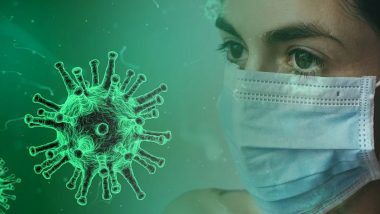New York, May 27: Inhalable nanobodies targeting the spike protein of the SARS-CoV-2 coronavirus can prevent and treat severe COVID-19, according to a study in hamsters.
Researchers from the University of Pittsburgh in Pennsylvania, US, tested the nanobodies -- which are similar to monoclonal antibodies but smaller in size, more stable and cheaper to produce -- for inhalation treatment against coronavirus infections in a pre-clinical model. 96% of COVID-19 Patients Have Antibodies Year After Recovery: Study
The findings, published in the journal Science Advances, showed that low doses of an aerosolised nanobody named Pittsburgh inhalable Nanobody-21 (PiN-21) protected hamsters from the dramatic weight loss typically associated with severe SARS-CoV-2 infection. It also reduced the number of infectious virus particles in the animals' nasal cavities, throats and lungs by a million-fold, compared to placebo treatment with a nanobody that doesn't neutralise the virus.
"By using an inhalation therapy that can be directly administered to the infection site -- the respiratory tract and lungs, we can make treatments more efficient," said co-senior author Yi Shi, Assistant Professor of cell biology at the varsity's School of Medicine.
The experiments showed that PiN-21 was protective when administered intranasally at the time of infection. Hamsters in the PiN-21 treatment group did not lose any body weight, unlike the placebo-treated animals who lost up to 16 per cent of their initial body weight after a week of infection.
Animals who received aerosolised PiN-21 nanobodies had milder changes in the lung structure and a lower degree of inflammation than those who received the placebo.
PiN-21 nanobodies, which are approximately four times smaller than typical monoclonal antibodies with exceptionally high stability, can easily reach deep into the lung. They also are much cheaper to produce and can be generated rapidly to swiftly adapt to the shape-shifting virus.
"COVID-19 is now a preeminent disease of the 21st century," said co-author Doug Reed, Associate Professor of immunology at Pitt.
"Delivering the treatment directly to the lungs can make a big difference for our ability to treat it," Reed added.
Researchers point out that the nanobodies and vaccines are complementary and do not compete with one another. Vaccines remain the best tool to stop the virus from spreading from person to person, but nanobodies will be useful to treat people who already are sick and those who can't get vaccinated for other medical reasons.
(The above story first appeared on LatestLY on May 28, 2021 11:16 AM IST. For more news and updates on politics, world, sports, entertainment and lifestyle, log on to our website latestly.com).













 Quickly
Quickly





















